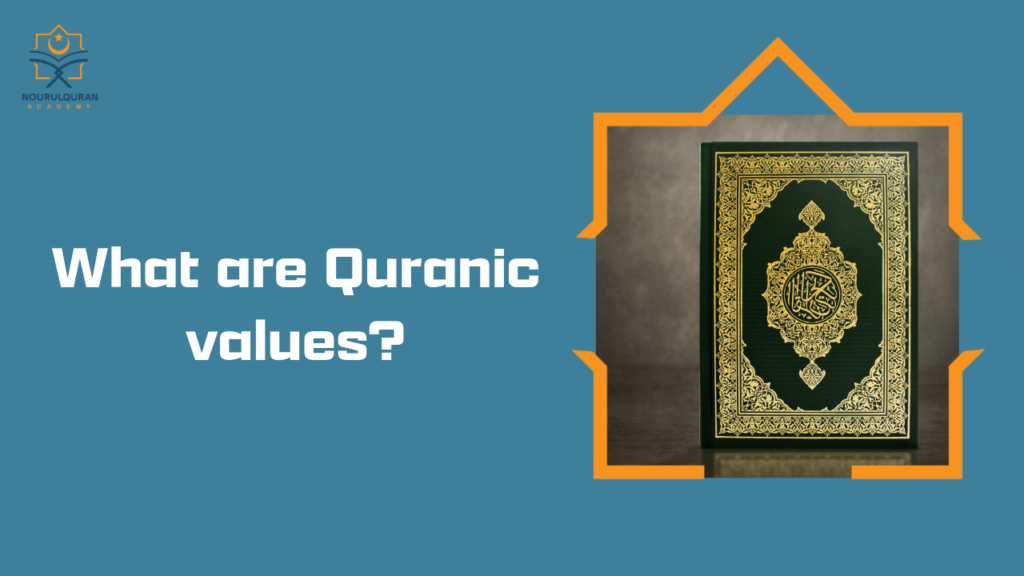Incorporating Quranic Values into Daily Life
When talking about Incorporating Quranic Values altogether into Daily Life The Holy Quran is also a rich source of values and principles that illuminate our path in life and help us live a dignified and happy life. Incorporating these values into our daily lives contributes to building a better society and a more moral and humane individual.

Incorporating Quranic Values into Daily Life
In the following lines, we explain in detail the ways to integrate Quranic values into daily life:
1. Recitation and contemplation of the Holy Quran:
- Allocate time daily to read the Holy Quran, contemplating and also understanding its meanings.
- Linking Quranic verses to the reality of our lives, and also applying them in different situations.
- Contemplate the meanings of Qur’anic verses, and reflect on their lessons and lessons altogether.
2. Imitating the Messenger may God bless him and grant him peace:
- Following the life of the Messenger, may God bless him and grant him peace, in all aspects of life.
- Applying his qualities and morals in our dealings with others.
- Make sure to follow his example in worship and transactions.
3. Raising children on Quranic values:
- Instilling Quranic values in the hearts of children from a young age.
- Teaching them the meanings of the Holy Quran, and applying it in their daily lives.
- Encouraging them to memorize the Holy Qur’an and contemplate its meanings.
4. Spreading Quranic values in society:
- Participate in spreading awareness of Quranic values in society.
- Calling on people to apply these values in their lives.
5. Applying Quranic values in various aspects of life:
Worship: Performing worship to the fullest extent, and linking it with good intentions.
Transactions: Dealing with others and honestly, and respecting their rights.
Work: Sincerity in work, and the pursuit of mastery and quality.
Morals: Having good morals, such as patience, generosity, and humility.
What are Quranic values?

Quranic values are a set of basic principles that form a comprehensive moral system that organizes a Muslim’s life and directs his behavior in various aspects of his life. These values are derived from the teachings of the Holy Quran and represent the essence of the Islamic religion. In the following lines, we explain in detail how to incorporate Quranic Values into Daily Life:
- Faith in God Almighty: It is the foundation of the Islamic faith, and faith in God Almighty represents belief in His existence, oneness, and His perfect attributes.
- Monotheism: which is singling out God Almighty for worship, and not associating anything with Him.
- Justice: It is giving everyone his right, and equality between people in rights and duties.
- Charity: doing good and donating to others without compensation.
- Honesty: always speaking the truth, and not lying or deceiving.
- Honesty: It is keeping trust, performing duties, and fulfilling covenants.
- Compassion: It is compassion for others, feeling their pain, and providing assistance to them.
- Patience: enduring hardships and difficulties, and not giving in to despair.
- Forgiveness: It is tolerance towards others, and not being arrogant or taking revenge.
- Humility: not being arrogant towards others, and feeling equal to them.
- Gratitude: It is an expression of gratitude to God Almighty for His blessings.
- Istighfar: It is asking forgiveness from God Almighty for sins and transgressions.
These values are not just theoretical principles, but rather practical values that a Muslim must apply in his daily life. Quranic values help a Muslim to be a good person and contribute to building a better society.
Types of Islamic values
Islamic values can be classified into several main categories, including:
First: Higher values:
- Truth: It is the foundation of the Islamic religion, and it includes monotheism, belief in God Almighty, the truthfulness of the Messengers, and the Last Day.
- Justice: achieving equality among people, giving everyone his due, and eliminating injustice.
- Charity: is doing good to others, providing assistance to them, and cooperating with them.
Second: Moral values:
- Honesty: is expressing the truth, and avoiding lying and cheating.
- Trust: It is the preservation and maintenance of what a person has been entrusted with, such as money, secrets, and responsibilities.
- Chastity: It is self-control from forbidden desires and adherence to the hijab and good morals.
- Righteousness: It is showing respect and appreciation to parents, maintaining family ties, and caring for the poor and needy.
- Courage: It is the courage to do good and confront injustice and falsehood.
- Patience: It is enduring hardships, being patient in crises, and not despairing or giving up.
- Humility: It is not being arrogant towards others, and recognizing the grace of God Almighty.
- Generosity and generosity: giving money and time to help others.
- Tolerance: Forgiving abusers and not committing to revenge.
Third: Social values:
- Family: Incorporating Quranic Values into Daily Life says that the family is the foundation for building an Islamic society, and its members must cooperate and interrelate.
- Society: It is a group of individuals who live together and must cooperate and cooperate.
- Shura: It is the participation of community members in decision-making and consultation on public matters.
- Social justice: is ensuring that all members of society obtain their rights and that there is no discrimination between them.
- Solidarity: It is the cooperation of community members with each other, to help those in need.
- Respect for cultural diversity: It is respect for the cultures and customs of others and a lack of intolerance for one’s own culture.
Fourth: Spiritual and religious values:
- Faith in God Almighty: is belief in the existence of God Almighty, His attributes, and His beautiful names.
- Belief in messengers and heavenly books: is the belief that God Almighty sent messengers to people and sent down heavenly books to them.
- Worshiping God Almighty: is the performance of obedience and religious duties, such as prayer, fasting, zakat, and Hajj.
- Piety: is following the commands of God Almighty and avoiding His prohibitions.
- Dhikr and supplication: It is the remembrance of God Almighty and supplication for His goodness.
- Submission to God Almighty: is contentment with God Almighty’s decree and destiny.
Fifth: Cultural values:
- Science: is the pursuit of knowledge, learning, and acquiring skills and sciences.
- Work: is making an effort to achieve lawful earnings and develop society.
- Creativity: is creating new ideas and improving performance in various fields.
- Beauty: is the appreciation of beauty in nature, the arts, and morals.
- Environmental conservation: It protects the environment from pollution and preserves natural resources.
Advantages of Incorporating Quranic Values into Daily Life
In the following lines, we highlight the advantages of integrating Quranic values into the daily life of the individual and society:
Individual:
- Happiness and tranquility: Qur’anic values promote a feeling of contentment and tranquility through relying on God and being content with His decree.
- Mental health: Quranic values improve psychological health, as they reduce feelings of anxiety, depression, and stress.
- Moral Strength: Incorporating Quranic Values into Daily Life develops good morals such as honesty, trustworthiness, justice, and benevolence.
- Balance in life: Quranic values help achieve the balance between various aspects of life.
- Sense of responsibility: Qur’anic values enhance the sense of responsibility towards society and the environment.
The society:
- Community cohesion: Qur’anic values also promote cohesion and compassion among community members.
- Security and stability: Quranic values altogether reduce crimes and negative phenomena in society.
- Social justice: Qur’anic values also establish the principles of justice and equality among members of society.
- Social Solidarity: Qur’anic values altogether encourage helping the needy and the poor.
- Development and advancement: Qur’anic values also help build a developed and sophisticated society.
The world:
- World Peace: Quranic values altogether promote the principles of peace and respect among different peoples.
- International Justice: Quranic values establish the principles of justice and equality between countries.
- Environmental protection: Quranic values also emphasize the importance of protecting the environment from pollution.
- Sustainable development: Quranic values also help achieve sustainable development in the world.

Incorporating Quranic Values in Education
Incorporating Quranic values into education is a shared responsibility between educational institutions, family, and society, and it has a significant positive impact on the student’s personality and value system, so in the following lines we talk about Incorporating Quranic Values into Daily Life and Education:
The importance of integrating Quranic values and incorporating Quranic values into daily life.
- Preparing a balanced generation: The world today faces many challenges, such as violence and extremism, and integrating Quranic values into education contributes to preparing a balanced generation with solid human and moral values.
- Building an integrated personality: The Holy Quran is a comprehensive way of life, and integrating its values into education contributes to building an integrated personality on the spiritual, mental, and physical levels.
- Instilling positive values: Incorporating Quranic values into education promotes the instillation of positive values in students, such as honesty, trustworthiness, justice, and mercy.
- Strengthening belonging: Integrating Quranic values into education helps strengthen students’ belonging to their religion and culture.
Ways to integrate Quranic values into education and incorporate Quranic values into daily life.
- Integrating Quranic values into school curricula: Quranic values can be integrated into various academic subjects, such as the Arabic language, social and religious sciences, and Nour Al Quran courses
- Activities and events: Activities and events can be organized that aim to instill Qur’anic values in the hearts of students, such as competitions for memorizing and interpreting the Holy Quran, and trips to religious sites.
- The role of the teacher: The teacher plays an important role in integrating Quranic values into education, through his behavior, morals, and interaction with students.
- Community participation: The family and society can contribute to integrating Quranic values into education by making students aware of the importance of these values and encouraging them to apply them in their lives.
Challenges:
- Lack of a comprehensive plan: Some educational institutions also may face difficulty in integrating Quranic values altogether into education due to the lack of a comprehensive and clear plan.
- Lack of resources: Some educational institutions may also face difficulty in integrating Quranic values into education due to a lack of financial and human resources.
- Misunderstanding: Some students may have a wrong understanding of the Holy Quran, which may hinder the process of integrating Quranic values into education.
The Importance of Incorporating Quranic Values into Daily Life
The Holy Quran is the primary source of Islamic legislation and contains many values and principles that regulate a Muslim’s life in all its aspects. Integrating these values into daily life is of great importance to the individual and society. In the following lines we also explain the importance of Incorporating Quranic Values into Daily Life:
Achieving happiness and satisfaction through incorporating Quranic values altogether into daily life.
Quranic values help achieve happiness and satisfaction in this life and the hereafter. When a Muslim is committed to honesty, honesty, justice, and benevolence, he feels comfortable and happy in himself and gains the respect and appreciation of others.
Building a virtuous society:
Quranic values contribute to building a virtuous society that enjoys justice, equality, security, and stability. When community members adhere to Quranic values, such as cooperation, solidarity, and compassion, it becomes a cohesive and compassionate community.
Raising a good generation:
Quranic values help raise a righteous generation with good morals and upright behavior. When parents raise their children on Quranic values, such as faith in God, honesty, and respect, they are also raising a generation capable of carrying the message of Islam and spreading goodness in the world altogether.
Improving human society:
Quranic values contribute to the advancement of human society altogether as a whole. When these values are widely applied. They also help solve many of the problems facing humanity, such as poverty, injustice, and wars.
Learn the Holy Quran and its interpretation and incorporate Quranic values into daily life
Learning and interpreting the Holy Quran using Nour Al Quran courses is one of the most important ways to integrate Quranic values into daily life. When a Muslim understands the meanings of the Holy Qur’an, he becomes more able to apply them in his life.
Meditation on the verses of the Holy Quran:
Contemplating the verses of the Holy Qur’an helps us contemplate their meanings and derive lessons and lessons from them.
Education on Quranic values and incorporating Quranic values into daily life:
Parents must also raise their children on Quranic values from a young age, through example, guidance, and also education.
Participation in religious activities:
Participating altogether in religious activities, such as prayer, Ramadan fasting, and also attending religious lessons, helps reinforce Quranic values in the soul.
Incorporating Quranic Values into Daily Life is of great importance to the individual and society. Quranic values help achieve happiness altogether and contentment, build a virtuous society, raise a righteous generation, and advance human society.
